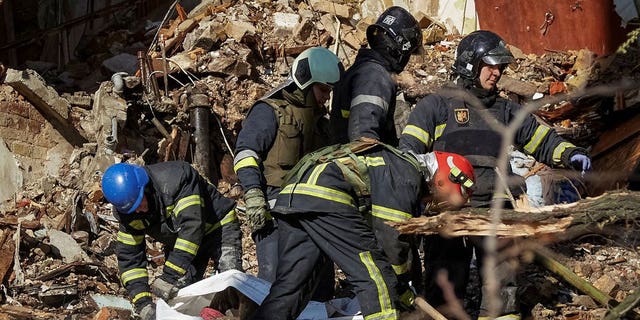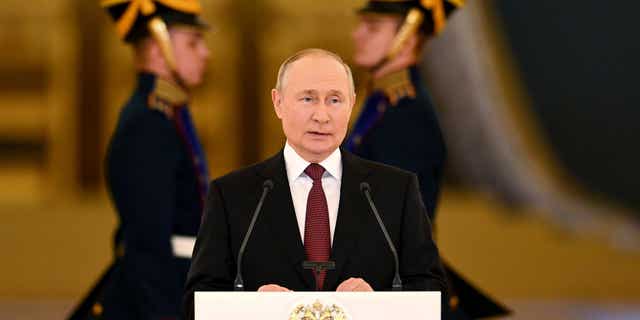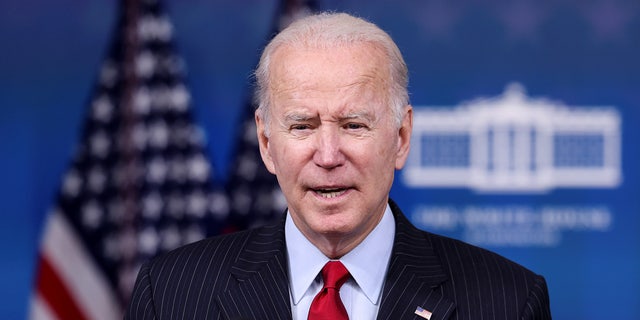Iran’s assistance to Russian war effort could make the country an enemy combatant, experts say
Continued assistance to Russia in the form of drones and weapons could place Iran at risk of being considered an enemy combatant in Ukraine, a status that opens the country up to sharing responsibility for war crimes.
“With the potential for missiles to be transferred by Iran to Ukraine, one has to begin to consider the Islamic Republic as a combatant on the side of Russia in the Ukraine war,” Foundation for Defense of Democracies senior fellow Behnam Ben Taleblu told Fox News Digital. “Indeed, if Iranian heavily armed suicide drones are striking Kyiv, then there’s no room left to entertain the fiction that Iran is just a passive partner in this conflict.”
Taleblu’s comments come after multiple reports over the last week indicated Iran has increased its assistance to the Russian war effort in Ukraine, including supplying Russian forces with suicide drones and surface-to-surface ballistic missiles.
Iranian Revolutionary Guard Corps members have also reportedly traveled to Crimea to help train Russian forces on the use of the Iranian-made weapons, a move the signals deepening military ties between the two countries.
IRAN NOW SELLING MISSILES TO RUSSIA, ADDING TO ITS KAMIKAZE DRONES, REPORT
That fact was confirmed by White House National Security Council spokesperson John Kirby on Thursday, who said “the Iranians decided to move in some trainers and some technical support to help the Russians use them with better lethality.”
“The information we have is that the Iranians have put trainers and tech support in Crimea, but it’s the Russians who are doing the piloting,” Kirby told reporters. “That’s our assessment at this time.”
“Aggressive regimes in Tehran and Moscow are increasingly dependent on each other because of the international backlash against their coercive foreign policies and imperial ambitions,” James Phillips, a senior research fellow for Middle Eastern affairs at The Heritage Foundation, told Fox News Digital. “Both have been heavily sanctioned as a result and cooperate to evade sanctions.”
Phillips noted that the two countries have also cooperated in Syria, where their militaries have joined forces to help keep Syrian President Bashar al-Assad in power.
But Iranian cooperation with Russia in Ukraine could be even more problematic for the country, with reports surfacing that Iranian-made “kamikaze drones” have been used to strike targets around Kyiv, including civilian areas.
The strikes were the most recent example of alleged war crimes Russia has committed in Ukraine, while using Iranian-supplied equipment to carry out the strikes could cause Iran to be considered at least partially responsible for the crimes.
“If Iranian personnel are launching and controlling the drones, or even just maintaining them for the Russians, then they should be considered combatants,” Phillips said. “At a minimum, they definitely are accomplices to Russian war crimes, since the Russians are using the drones to target civilians and civilian infrastructure.”

RUSSIA USING IRANIAN-MADE ‘KAMIKAZE DRONES’ TO STRIKE AROUND KYIV
Russia’s invasion of Ukraine largely cut the country off from much of the international community, forcing the Kremlin into partnerships with countries such as Iran and North Korea. Inconsistent results on the battlefield have complicated matters for Russian President Vladimir Putin, with the Russian military depleting stocks of munitions in an attempt to regain the initiative against emboldened Ukrainian forces. As a result, Russia has turned to its newfound partners for help in maintaining the war effort.
“It would be logical to consider Iran a party to the Russia-Ukraine war, considering that the Islamic Republic provides lethal military hardware that helps Moscow kill Ukrainians,” Rebekah Koffler, a former DIA intelligence officer and the author of “Putin’s Playbook: Russia’s Secret Plan to Defeat America,” told Fox News Digital. “The same issue can be raised about North Korea, who has been supplying millions of artillery shells and rockets to the Russians. Putin has been assembling a coalition of international pariahs to help him plug some holes in his conventional weapons arsenal as he is running short on his own precision-strike missiles.”

WHITE HOUSE DESPERATE TO PREVENT BIDEN-PUTIN FACEOFF AT G20 SUMMIT: REPORT
Koffler noted that Russia already considers the U.S. and NATO as a party to the war, with the American-led alliance providing Ukraine with the lethal weapons it needs to sustain its defense against the invasion. However, an acknowledgment by the West that Iran is a combatant in the war would force the U.S. into revealing the true scope of the conflict.
“Once Washington acknowledges that Iran and North Korea are de facto enemy combatants on the side of the Kremlin, everyone will recognize the obvious – we are in a East vs. West battle,” Koffler said. “And the battlefield is expanding beyond geographic boundaries and into cyber, economics and other domains.”
Despite Iran’s participation in the war in Ukraine, the White House has continued its effort to rekindle the Obama-era Joint Comprehensive Plan of Action (JCPOA), better known as the Iran nuclear deal, though talks have recently stalled and a new agreement has become increasingly unlikely.
IRANIAN MILITARY MEMBERS ‘MAY’ BE TRAINING RUSSIAN TROOPS TO USE ‘KAMIKAZE’ DRONES IN UKRAINE: REPORT
“The White House is still under the delusion that it can reach a nuclear deal with Iran and Russia is a party to those talks,” Koffler said. “It is largely the same cast of characters, the Obama 2.0 crew, who were pushing a foolish ‘reset’ policy with Russia – when Joe Biden was the VP – as Putin was hatching his plan to re-subjugate Ukraine and other post-Soviet states.”
Instead, Koffler argued that President Biden should be “standing up a robust deterrence posture and developing counter-strategy.”
Part of that counter-strategy would typically include Saudi Arabia, a longtime security partner whose relationship with the U.S. has deteriorated under Biden’s leadership. That fractured relationship came to a head last week, when the Saudi-led OPEC+ oil cartel opted to decrease production of oil despite pleas from the White House to ramp up production to help alleviate an energy crisis in the West.
That move was not well-received in Washington, where Biden and several lawmakers accused the oil-rich kingdom of siding with Russia in its war with Ukraine. The accusation was denied by Saudi Arabia, which claimed its motivations were purely for the economic benefit of OPEC+ member-states.

Nevertheless, Biden has warned of “consequences” for Saudi Arabia and vowed to review the U.S. security relationships with the country, a move Phillips questioned amid the administration’s seemingly softer stance on Iran.
“While the Biden administration is threatening to punish Saudi Arabia for siding with Russia on oil prices, it has turned a blind eye to Iran’s much more extensive cooperation with Moscow on oil prices, arms sales, Ukraine and Syria,” Phillips said. “The administration should focus more on pushing back against adversaries on security issues and less on penalizing problematic friends on political issues such as high gas prices in the run-up to the midterm elections.”
Read the full article Here


